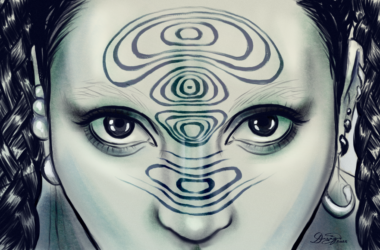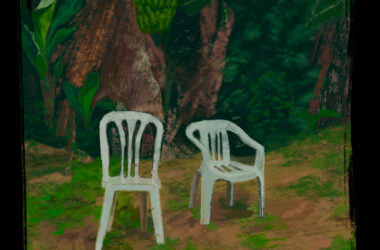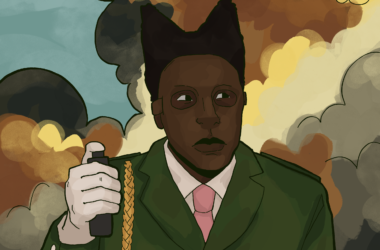We Are Who We Are (TV miniseries)
By Jordana Curnoe, Contributor
The HBO miniseries We Are Who We Are, directed by Luca Guadagnino, follows a headstrong army brat from New York City named Fraser (Jack Dylan Grazer) who moves to a fictional American military base in Chioggia, Italy. There, he befriends a group of other army brats including Caitlin/Harper (Jordan Kristine Seamón). As they grow closer, Caitlin begins to question her gender identity and feels that she cannot exist inside her old world the way she is expected to. The series consists of visually captivating shots of curiously beautiful Italian scenery and awkward but fitting close-up shots of people’s faces. Although few questions are fully answered, the story demonstrates the importance—and cost—of being unashamedly yourself. Each of the characters tries to accept that they cannot change themselves or what they’ve experienced; they simply are who they are.
Interview with the Vampire – Season 2 (TV show)
By Siena Torres, Contributor
The AMC television adaptation of Anne Rice’s novel Interview with the Vampire is the queer vampire show we all needed. Set in the dual timeline of present-day Dubai and 19th-century New Orleans, the story of Louis (Jacob Anderson) and his complex relationship with his creator and lover, Lestat (Sam Reid), unfolds through flashbacks as he narrates it to a reporter. Through stellar performances ranging from comedic to deadly, this show does not hold back with gore, nudity, or the darkest parts of its “failmarriage.” The second season premiered this summer, raising the stakes as the consequences get deadlier when Parisian vampires and engrossing theatrics merge. The third season has been teased with Lestat as a Chappell Roan-inspired rockstar vampire (yes, you read that correctly), so no need to fret— your new favourite show will be back in no time.
Gayotic with MUNA – Season 3 (podcast)
By Dana Prather, Arts & Entertainment Editor
Gayotic with MUNA is back, and it’s here to save the (podcasting) world. Hosted by indie pop band MUNA’s Katie Gavin, Josette Maskin, and Naomi McPherson, the podcast is a freeform gabfest covering everything from the artists’ personal lives and artistic processes to their political takes and favourite memes. Thanks to the band’s (and by extension, the podcast’s) growing popularity, the show’s third season offers new video episodes alongside the tried-and-true audio-only format. The result? A front-row seat to all the unbridled chaos and unabashedly queer content the show’s name would suggest. While the podcast certainly benefits from its wide range of special guest appearances—fan-favourite drag queen Trixie Mattel, singer-songwriter and guitarist extraordinaire Towa Bird, and Oscar-winning producer FINNEAS are just a few of the stars that have graced the studio this season alone—Gayotic is at its best when it returns to its roots: Solo episodes featuring the trio’s constant chatter and jokes that will make you feel like you’re yapping along with your best friends.
Dìdi (弟弟) (film)
By Amelia McCluskey, Contributor
Sean Wang’s debut feature Dìdi (弟弟) depicts coming of age in 2008 with nostalgic delight. Attempting to pass the time before the first day of high school, thirteen-year-old Chris (Izaac Wang) watches kissing tutorials on YouTube, practices kickflips in the garage, and swipes Paramore t-shirts from his older sister’s closet. While the film is funny and whimsical—full of talking fish, reanimated squirrels, and some of the most realistic middle-schooler dialogue I’ve ever heard—Chris struggles with a sense of profound loneliness. Dìdi (弟弟) earns its comparisons to films like Lady Bird and Eighth Grade with its deeply heart-wrenching moments as Chris desperately tries to fit in. After changing his ringtone to impress his crush and berating his mom in front of his friends, he only finds himself further ostracized by his peers. Through its unexpected combination of drama and humour, Dìdi (弟弟) provides a fresh perspective on familiar themes, producing a story that feels universal, yet wholly unique.
The Road to the City (novella)
By Kellie Elrick, Arts & Entertainment Editor
Delia is seventeen and ashamed. She has lofty dreams of life as a housewife in the city. She hates her family’s rotting red house in the village, solacing herself with walks along the road by the river into the city, where there are orchestras and women who want to be seen. Her distant cousin Nini walks with her; he is in love with her. Natalia Ginzburg’s The Road to the City was published in Italian in 1942 under the pseudonym “Alessandra Tornimparte”—Ginzburg was Jewish, and Mussolini’s racial laws forbade her from publishing. Her prose is cold, but it plunges into the deep, bubbling underbelly of disgust and desire: Delia looks at her greying mother and thinks, “If I had met her in the city I should have been ashamed.” Delia is poor, then pregnant, then married, then rich. One day, it appears that she is living as she wished—with a maid and a big house in the city and a velvet blanket—but Nini is gone, and the house, and the days, seem to empty out into the past.
brat (album)
By Charlotte Hayes, Staff Writer
To be ‘brat’ is to embrace your flaws, mess, and ego—at least according to British singer-songwriter and DJ Charli XCX. Her summer release brat is an intensely energetic yet emotionally vulnerable electronic dance-pop album which embodies the essence of breaking down and then getting back up to party again; revelling in the emotional complexity that comes with growing up, while never letting it get in the way of having a good time. Blunt, honest, and volatile, brat is the album to tease the party animal out of your sad-indie-bedroom pop-loving soul. Even though the album is well worth highlighting on its own artistic merits, it exists within a larger cultural context of trends this summer. While we were all in the throes of having our own ‘brat girl summer,’ another unlikely figure joined the brat-iverse: Kamala Harris. Following Joe Biden’s termination of his presidential campaign and subsequent endorsement of Harris, Charli posted a tweet that irrevocably linked her album with the upcoming U.S. election. Somehow, this club-track-packed album has gone from songs about partying every single day of the year, to unpacking generational trauma, and now… to becoming invested in the political future of your country? The campaign’s decision to lean into the support from the British pop star is one that has great potential to bring in a new generation of voters by using a vocabulary that they find more engaging or approachable. However, they could run the risk of leaning too far into the joke at the expense of the promotion of any substantive policy.









